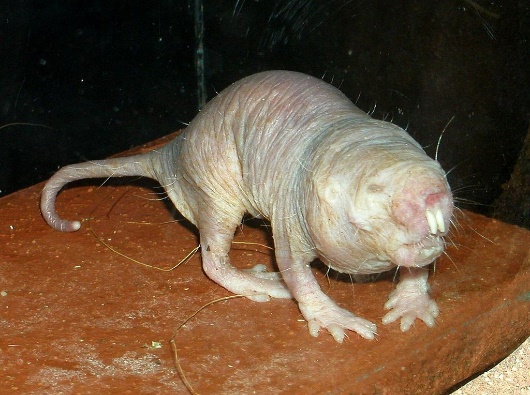The Naked Mole Rat is an unusual rodent that lives in East African in underground burrows. These animals can survive in these overcrowded burrows despite very low oxygen levels being present. They do this by producing fructose, which helps shift the production of energy they need to live from the mitochondria (which use oxygen to make energy) to glycolysis ( a primitive system in which energy can be made in the absence of oxygen). By using less oxygen, they can survive much longer than most other animals in these low oxygen settings.
The discovery that fructose can be used as a fuel in low oxygen states may be relevant to cancer. When cancer cells spread (metastasize), they often reach places in the body where the oxygen supply is low, and they have to stimulate local production of blood vessels to supply the oxygen they need to grow. So many tumor cells rely on glycolysis to make their energy. Fructose thus becomes an ideal nutrient for cancer cells, and numerous studies suggest that high sugar diets may encourage tumor growth, especially for breast, liver and colon cancers.
Interestingly, the naked mole rat does not get cancer as it has developed ways to counter the effects of fructose by generating a powerful antioxidant system and also because it makes certain substances (high molecular weight hyaluranon) that may provide additional protection.

Photo by By Roman Klementschitz (https://commons.wikimedia.org/w/index.php?curid=252701)
References
- Paragas, N., Qiu, A., Zhang, Q., Samstein, B., Deng, S.X., Schmidt-Ott, K.M., Viltard, M., Yu, W., Forster, C.S., Gong, G., Liu, Y., Kulkarni, R., Mori, K., Kalandadze, A., Ratner, A.J., Devarajan, P., Landry, D.W., D’Agati, V., Lin, C.S. and Barasch, J. (2011) The Ngal reporter mouse detects the response of the kidney to injury in real time. Nat Med 17: 216-222.
- Nakagawa, T., Lanaspa, M.A., Millan, I.S., Fini, M., Rivard, C.J., Sanchez-Lozada, L.G., Andres-Hernando, A., Tolan, D.R. and Johnson, R.J. (2020) Fructose contributes to the Warburg effect for cancer growth. Cancer Metab 8: 16.